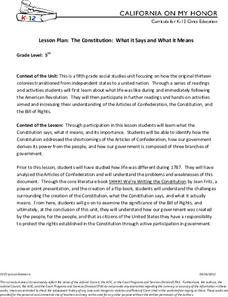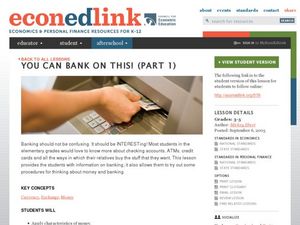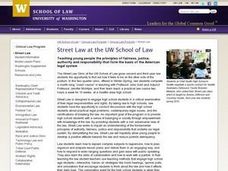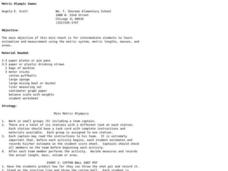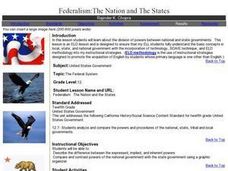Judicial Learning Center
About Federal Judges
Not just anybody can do the job of a federal judge, but according to the United States Constitution just about anybody can be appointed. The lesson outlines the process and requirements for becoming a federal judge, focusing on the...
Judicial Learning Center
About Federal Judges: Qualifications of Judges
"Help Wanted: A Supreme Court Justice." What should be included in the ad? Learners ponder the question during a lively activity that asks them to examine the qualifications for various federal offices and then create job postings....
Judicial Branch of California
The Constitution: What It Says and What It Means
Learners get the chance to act as representatives to the Constitution Convention, and must decide whether or not to recommend your state ratify the new framework. After examining the Constitution line-by-line, they consider their...
Council for Economic Education
You Can BANK On This! (Part 1)
Students investigate the concepts of money management and banking through Internet activities. In this economics lesson plan, students discuss the characteristics of money and how people once bartered with goods instead of paying with...
Curated OER
Political Parties and What They Do
The emerging politicians in your government might be familiar with the words "Democrat" and "Republican," but what do they really know about the role of political parties in America? Use this activity to reinforce information from your...
Curated OER
US Constitution
Think about the Bill of Rights and the Declaration of Independence with your budding historians. They analyze the importance of historical documents by examining several famous documents, and then they complete activities that check...
Curated OER
4-H Citizenship Activity Page - Beginning Level
This is a 4-H citizenship activity that asks learners to examine county government, city councils, the three branches of the United States government, and complete a community service project. It also includes a word search,...
American Bar Association
What Is Separation of Powers?
Who has the power? Scholars investigate the creation of the three branches of government in the United States Constitution. They analyze just why the framers created the branches the way they did.
Curated OER
The Articles of Confederation (1781-1789)
In this online interactive history instructional activity, learners respond to ten short answer and essay questions about the Articles of Confederation. They may check some of their answers on the interactive instructional activity.
Curated OER
ADULT ESOL LESSON PLAN--Level 5--Time and Money
Students, after defining and reviewing the extensive list of vocabulary words on the board, examine various banking systems and terms (loans, interest rates, investments, mortgages, etc.). They also show mastery of this task by...
Curated OER
Cartoons for the Classroom: Defining the Separation of Power
In this current events worksheet, students analyze a political cartoon about the separation of powers in the American government and respond to 3 talking point questions.
Curated OER
Why Do We Separate Power?
Students investigate the separation of powers that are outlined in the Constitution. The lesson includes essential questions that are used to guide the research. The information is used to increase knowledge of how power is used in...
Curated OER
Introduction to the Constitution: The First Three Articles of the Constitution, Separation of Powers
Students review the first three articles of the United States Constitution. In groups, they examine the three branches of government and their function. They follow the path of a bill until it becomes law and discuss Congress' role.
Curated OER
Metric Olympic Games
Students participate in a metric Olympics. In this metric measurement activity, students participate in 6 events that require them to predict, estimate, and measure lengths, masses, and area in metric units.
Curated OER
The Spread of Enlightenment Ideas
Looking for a simple and straightforward reference on the Enlightenment for your young historians? Check out this list of key terms and important figures from the period, followed by a traditional assessment where your learners will be...
Curated OER
Eco-enrichers
Students discover the importance of plant and animal components within soil. In this soil lesson, students test the quality of soil. Students then conduct an experiment adding different components to bags of soil to see what will...
Curated OER
Federalism: The Nation and The States
Twelfth graders discuss the division of powers between national and state governments. Groups create a PowerPoint slide representing one of the 3 types of powers.
Curated OER
Chapter 15: Monetary Policy
Even well-versed economists will appreciate the clarity and cohesiveness of this presentation. Covering monetary policy and open-market operations with bullet points and graphs, these slides would be a good addition to both a basic and...
Curated OER
A Solution for Precipitation
Young scholars predict the product of chemical reaction using the solubility rules. For this chemistry lesson, students balance ionic equation. They perform a lab to check if their predicted products are correct.
Curated OER
Classification
Students explore the observable properties of matter and utilize them in classification. They use a binary classification system to divide objects, then justify their scheme.
Curated OER
Money, Commercial Banking, and Interest
Stdents explore the operation of the commercial banking system and the mechanics of money creation through the lending process. They investigate various interest rates to develop the relationship between interest rates and risk and...
Cornell University
Predicting Chemical Reactions
Prove the Law of Conservation of Mass through a lab investigation. A well-designed lesson asks groups to combine materials and monitor indicators for chemical reactions. Measuring the mass of the reactants and products allows individuals...
Concord Consortium
Summertopia
What if the unit of money changes tomorrow? Would you be prepared? Learners calculate currency conversions using fictional units of money. The fictional unit's base is 60 rather than 100, which can connect to time or even degrees.
Curated OER
Comparative Government: Japan & the United States
Students compare the governmental systems of Japan and the United States. As a class, they discuss the differences between the parliamentary system and the presidential system. Pupils read provided handouts about the duties of a a...




